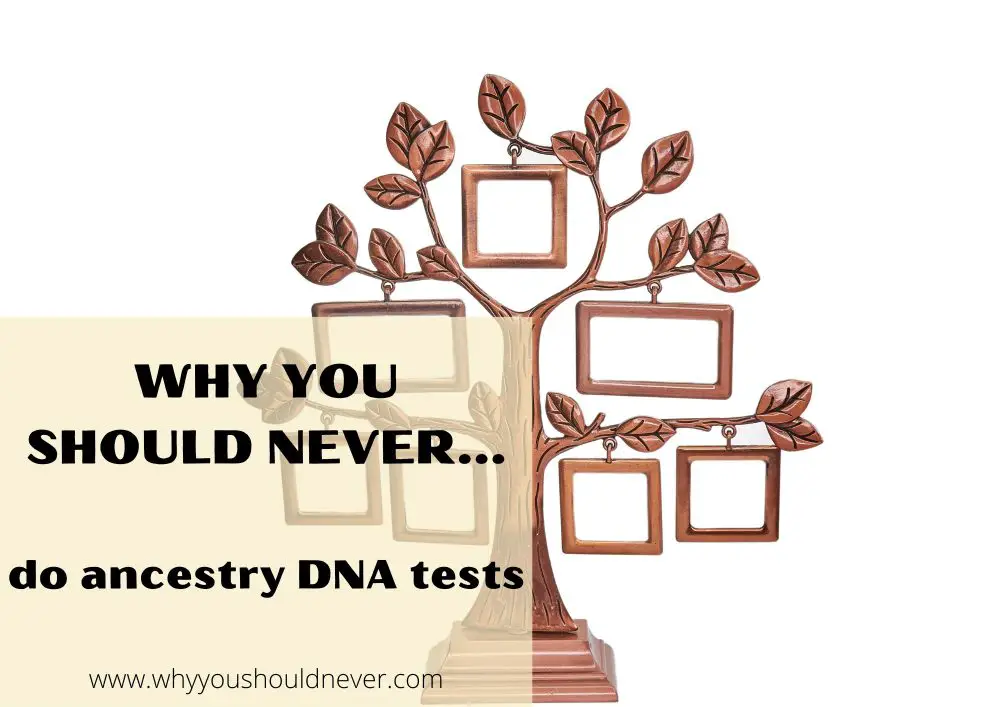![]()
Why You Should Never Do Ancestry DNA Tests
As the popularity of at-home DNA testing kits continues to rise, many people are eager to learn more about their genetic makeup and ancestral roots. After all, in order to know where we’re going in life, we need to know where we’re coming from.
For many people, particularly those with limited connection to their families and histories, ancestry tests have given them answers to questions they’ve always had; while for others, these tests have put them in touch with long-lost family members. In some cases, people have discovered hereditary diseases or anomalies that have allowed them to better take care of their health.
But sadly, these benefits might not outweigh the negatives of handing your DNA over to total strangers. Before you eagerly spit into that tube and send it off to a testing company, it’s important to consider the potential risks and drawbacks of sharing your personal genetic information. In this article, we’ll consider 10 reasons why you should think twice before taking an ancestry DNA test.
10 reasons why you shouldn’t do an ancestry DNA test
1. Privacy Concerns
Your personal genetic data may not be as secure as you think. Testing companies are not required to meet the same privacy standards as hospitals or other medical institutions, and many do not encrypt the data they collect. This means that your DNA information could be accessed without your permission.
2. Accuracy
There’s no guarantee that the results of an ancestry DNA test will be completely accurate. Different companies use different methods to analyze DNA, and it’s possible for errors to be made. Plus, the accuracy of your results may vary depending on the size of the database the company uses to compare your sample.
3. Unpleasant findings
Ancestry DNA tests can reveal some unpleasant facts about your family history, such as the existence of unsavory ancestors or relatives. What’s more, if you’re someone who has been told one thing about your ethnicity or genealogy, chances are you’ll discover that much of what you were told was false.
For example, you could have spent your whole life believing that you were a pure-blooded Scot (almost no one is “pure-blooded” anything, btw), only to have your results come back saying you have some Dutch ancestry!
4. Medical implications
Some companies offer tests that can give you insight into any potential health risks you may have. While this may be useful, the results may prompt unnecessary worry or even encourage people to make decisions based on flawed information.
5. Financial cost
Taking an ancestry DNA test can be expensive, and the cost of additional tests or services can quickly add up. For example, some companies charge extra for detailed health reports or access to family trees. The standard cost of a test can range from $79 to $199, and that’s not including the cost of additional testing.
6. Limitations
Ancestry DNA tests have their limits. They can only tell you about your direct ancestors, and can’t tell you anything about more distant relatives. Plus, the results are based on the company’s database, so if there are not enough people in the database who are related to you, the accuracy of the results may be reduced.
The information you get will be pretty vague, and won’t, for example, include information about specific tribes or groups your ancestry comes from.
7. Confusion
The results of an ancestry DNA test can be confusing, especially if you don’t have any prior knowledge of genealogy or genetics. You might have difficulty interpreting the results or making sense of the data, which can be overwhelming.
8. Inaccurate ethnicity estimates
The estimates of ethnicity that ancestry tests provide can be inaccurate, as they are based on the company’s database and not your actual family history. If the company’s database is not representative of the ethnicities you’re related to, the estimated percentages could be way off.
9. False sense of identity
Taking an ancestry DNA test, believe it or not, can give you a false sense of identity. While the test might provide insight into where your ancestors may have come from, it cannot tell you who you are. Your identity is far more complex than just your genetic makeup.
10. Potential misuse
Tin foil hat time! We’ve all seen those terrifying sci-fi movies about how DNA can be used to control, manipulate, and oppress people. Cloning, anyone? In the age of genetic engineering, it’s important to consider the potential misuse of your DNA information. Companies that offer ancestry tests may use your data in ways you don’t expect or approve of.
Wrapping up
I hope this has given you some food for thought. You’ve gotta ask yourself if taking the test is really necessary. How will it help you in your everyday life? And are the risks worth it?
If you find that you simply must know more about your ancestry, then research the company you’re considering and read up on their privacy and security policies. Not all DNA testing companies are created equal, so make sure you choose one that you can trust.
